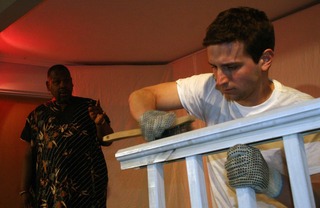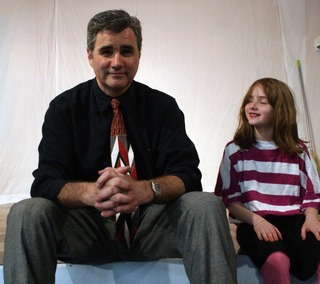
By Andrew Firestone
Somerville playwright John Shea’s newest production, “The Painter” attempts to answer society’s toughest questions by juxtaposing two downtrodden individuals; a penniless Irish-immigrant painter, and his domineering, affluent African-American employer.
“If you put a black man and a white man on stage there are certain expectations that the audience has right away and if there is any animosity there at all, I think that race will heighten that animosity,” said Shea. “Automatically, our mind does make some assumptions, whether negative or positive, whether we want to admit it or not, I think that is true.”
The unnamed painter, played by Jared Wright, threatened and bullied by his employer throughout the day, takes his revenge by murdering him in his home, only to return to finish the job the next day. Through his discussions with Michael Nurse’s unnamed homeowner, (while alive and dead) a radical dialogue ensues regarding the ultimate state of modern society.
“I think African-Americans have a bigger struggle than other people fighting for the same rights,” said Shea. He added that while “the plight of the [illegal] immigrant is not an easy one,” “I still think that the African-American has just as big a struggle.”

Shea admits that he wrote the play during the campaign period of President Barack Obama, and was stunned when, after Obama won, he was met with such a divided America. “I know a lot of people who still don’t want a black man in charge; they are afraid of it, they don’t like it, and they were shocked that a black man won,” he said. “Racism is still rampant.”
Perhaps one of the most controversial, if not magnificent scenes, takes place in the painter’s own mind, when after being threatened with deportation by the homeowner, he fantasizes about a time when he would be the master, and the black man the slave.
“Without the slave scene, I think the murder would only be nothing more than a device, and I didn’t want that to be just a way to get the play started or just a way to sensationalize something,” he said.
Shea added that, despite the bleak thematic matter of the play, he is ultimately optimistic about reconciliation. “If I didn’t think that, there would be no hope,” he said. “I think things change quicker for other minorities [than for African-Americans].”
Ultimately, Shea sees the discussion as necessary, as it makes no sense to ignore such a huge undercurrent of American life.
“I don’t know what the fear is that keeps us all wanting to separate and seclude ourselves,” he said, qualifying, “I don’t think that’s true across the board, because Somerville is a very diverse city and it seems to be working out quite well.”
“There is a protection that we all want to have for our beliefs, our system, our thoughts and I think that that is really what drives it all. Sure we want to include everybody, we want to say that we are diverse and embrace that but there’s also that ‘what about me? How do I fit in?’”
“I think that there is a self-centered meanness that keeps us going, and it does eventually lead to imploding on itself because you cannot survive like that,” he said.
The Painter is currently playing in the Unity Church at 6 William St., Friday and Saturday for the next two weeks, with Friday April 29 already sold out. (April 22, 23 and 30 are still available). Tickets are $15.















Reader Comments